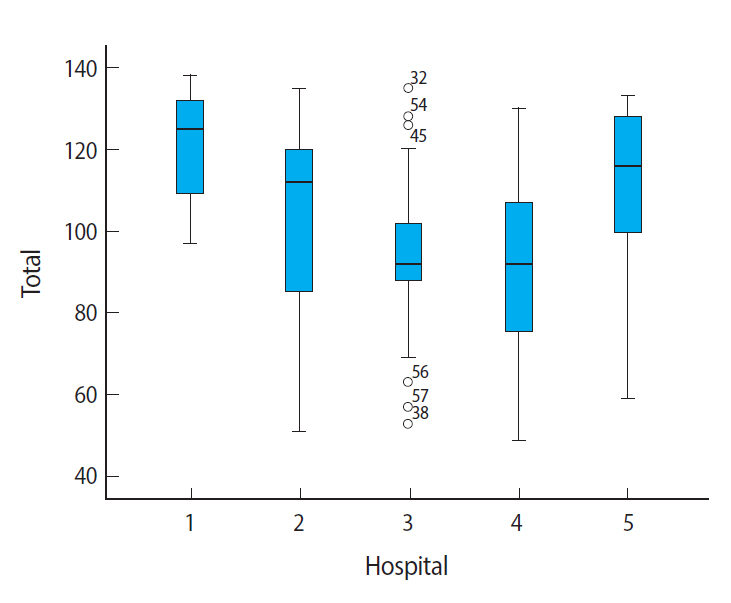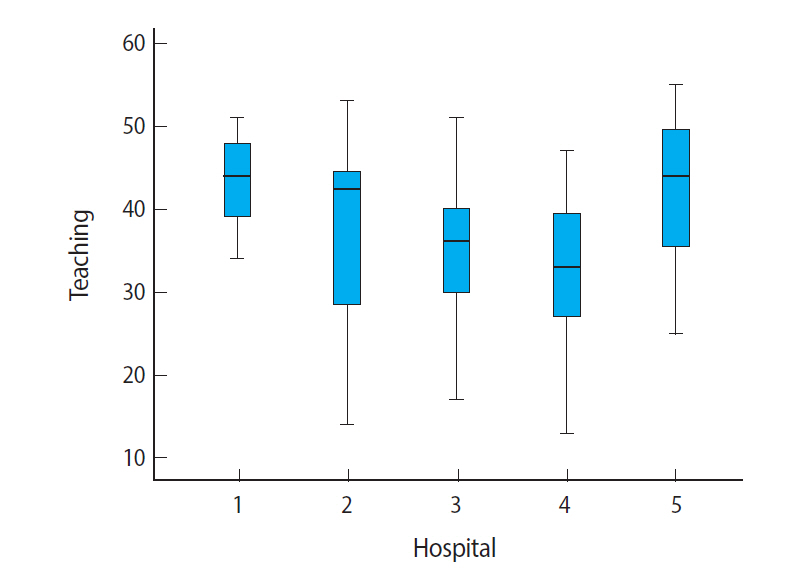J Educ Eval Health Prof.
2015;12:14. 10.3352/jeehp.2015.12.14.
Evaluation of hospital-learning environment for pediatric residency in eastern region of Saudi Arabia
- Affiliations
-
- 1Department of Pediatrics, College of Medicine, King Faisal University, AlHsa, Saudi Arabia.
- 2Department of Family & Community Medicine, College of Medicine, King Faisal University, AlHsa, Saudi Arabia. amkhan@kfu.eud.sa
- 3Department of Pediatrics, University of Dammam, Dammam, Saudi Arabia.
- KMID: 2402021
- DOI: http://doi.org/10.3352/jeehp.2015.12.14
Abstract
- PURPOSE
No study had been conducted to assess the hospitals' environment for learning purposes in multicenter sites in Saudi Arabia. It aims to evaluate the environment of hospitals for learning purposes of pediatric residents.
METHODS
We applied Postgraduate Hospital Educational Environment Measure (PHEEM) to measure the learning environment at six teaching hospitals in the Eastern Region of Saudi Arabia from September to December 2013.
RESULTS
The number of respondents was 104 (86.7%) out of 120 residents and 37 females and 67 male residents have responded. The residents' response scored 100 out of 160 maximum score in rating of PHEEM that showed overall learning environment is favorable for training. There were some items in the social support domain suggesting improvements. There was no significant difference between male and female residents. There was a difference among the participant teaching hospitals (p<0.05).
CONCLUSION
The result pointed an overall positive rating. Individual item scores suggested that their social life during residency could be uninspiring. They have the low satisfactory level and they feel racism, and sexual discrimination. Therefore, there is still a room for improvement.
Keyword
MeSH Terms
Figure
Cited by 1 articles
-
Moroccan residents’ perceptions of the hospital learning environment measured with the French version of the Postgraduate Hospital Educational Environment Measure
Hajar Berrani, Redouane Abouqal, Amal Thimou Izgua, Sun Huh
J Educ Eval Health Prof. 2020;17:4. doi: 10.3352/jeehp.2020.17.4.
Reference
-
1. Roff S. The Dundee Ready Educational Environment Measure (DREEM)--a generic instrument for measuring students’ perceptions of undergraduate health professions curricula. Med Teach. 2005; 27:322–325. http://dx.doi.org/10.1080/01421590500151054.
Article2. Miles S, Swift L, Leinster SJ. The Dundee Ready Education Environment Measure (DREEM): a review of its adoption and use. Med Teach. 2012; 34:e620–e634. http://dx.doi.org/10.3109/0142159X.2012.668625.
Article3. Khan AS, Akturk Z, Al-Megbil T. Evaluation of the Learning Environment for Diploma in Family Medicine with the Dundee Ready Education Environment (DREEM) Inventory. J Educ Eval Health Prof. 2010; 7:2. http://dx.doi.org/10.3352/jeehp.2010.7.2.
Article4. Roff S, McAleer S, Skinner A. Development and validation of an instrument to measure the postgraduate clinical learning and teaching educational environment for hospital-based junior doctors in the UK. Med Teach. 2005; 27:326–331. http://dx.doi.org/10.1080/01421590500150874.
Article5. Algaidi SA. Assessment of Educational Environment for Interns Using Postgraduate Hospital Educational Environment Measure (PHEEM). J Taibah Univ Med Sci. 2010; 5:1–12.
Article6. Al-Marshad S, Alotaibi G. Evaluation of Clinical Education Environment at King Fahad Hospital of Dammam University using the Postgraduate Hospital Education Environment Measure (PHEEM) Inventory. Educ Med J. 2011; 3:e6–e14.
Article7. Al-Freihi . Perspective on the Saudi Council for health specialities. Saudi J Gastroenterol. 2003; 9:1–5.8. Gooneratne IK, Munasinghe SR, Siriwardena C, Olupeliyawa AM, Karunathilake I. Assessment of psychometric properties of a modified PHEEM questionnaire. Ann Acad Med Singapore. 2008; 37:993–997.9. Riquelme A, Herrera C, Aranis C, Oporto J, Padilla O. Psychometric analyses and internal consistency of the PHEEM questionnaire to measure the clinical learning environment in the clerkship of a Medical School in Chile. Med Teach. 2009; 31:e221–e225. http://dx.doi.org/10.1080/01421590902866226.
Article10. Boor K, Scheele F, Scherpbier AJ, Teunissen PW, Sijtsma K. Psychometric properties of an instrument to measure the clinical learning environment. Med Educ. 2007; 41:92–99. http://dx.doi.org/10.1111/j.1365-2929.2006.02651.x.
Article11. Wall D, Clapham M, Riquelme A, Vieira J, Cartmill R, Aspegren K, Roff S. Is PHEEM a multi-dimensional instrument? An international perspective. Med Teach. 2009; 31:e521–e527. http://dx.doi.org/10.3109/01421590903095528.
Article12. Collier VU, McCue JD, Markus A, Smith L. Stress in medical residency: status quo after a decade of reform? Ann Intern Med. 2002; 136:384–390. http://dx.doi.org/10.7326/0003-4819-136-5-200203050-00011.
Article13. Peterlini M, Tiberio IF, Saadeh A, Pereira JC, Martins MA. Anxiety and depression in the first year of medical residency training. Med Educ. 2002; 36:66–72. http://dx.doi.org/10.1046/j.1365-2923.2002.01104.x.
Article
- Full Text Links
- Actions
-
Cited
- CITED
-
- Close
- Share
- Similar articles
-
- Evaluation of the Learning Environment for Diploma in Family Medicine with the Dundee Ready Education Environment (DREEM) Inventory
- Comparison of Three Internship Training Sites for an Undergraduate Health Information Management Program in Saudi Arabia
- Occurrence of Zoosporic Organisms in the Western Region of Saudi Arabia
- Missense Mutations in the CTSC Gene in Saudi Families Segregating Papillon-Lefèvre Syndrome
- Continuing medical education as a national strategy to improve access to primary care in Saudi Arabia





